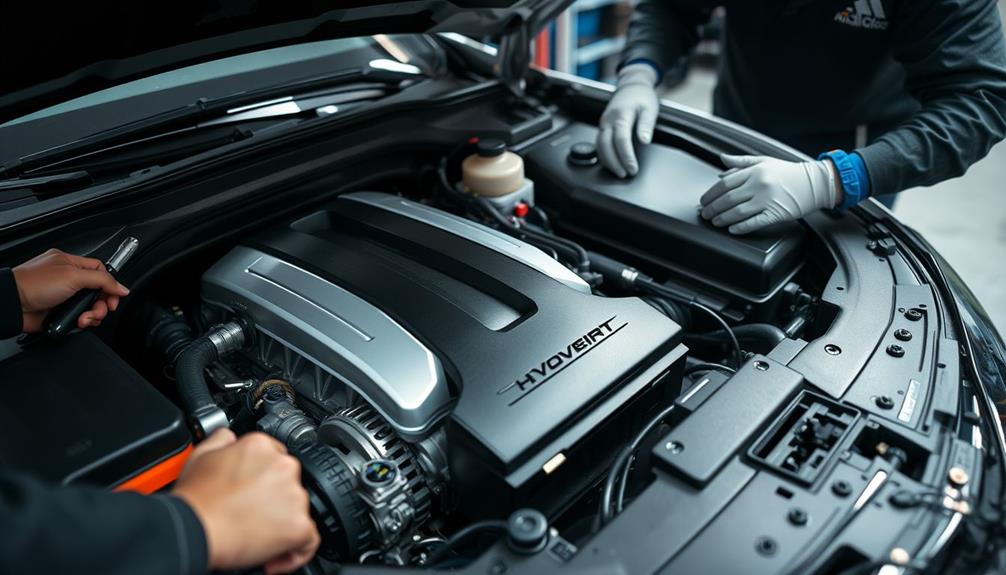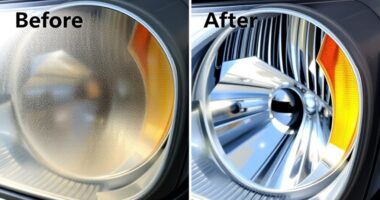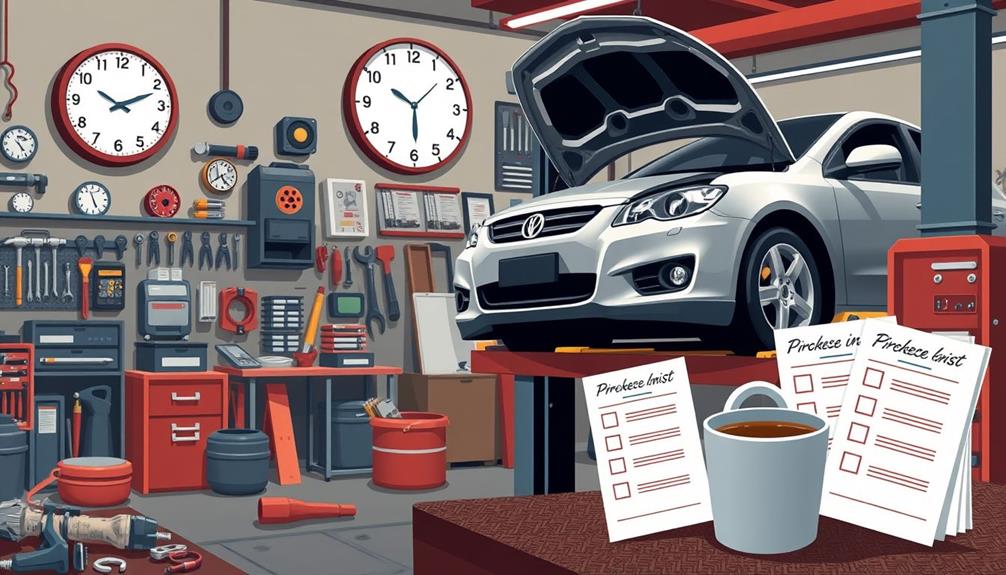Car tuning can be legal, but it depends on federal and state regulations you've got to follow. You need to guarantee that any modifications comply with emissions laws to avoid fines or legal issues. This means not tampering with emissions control systems. Additionally, some modifications could void your warranty or lead to penalties. It's essential to stay informed about local noise and safety regulations as well. Responsible tuning means knowing what changes are allowed without causing trouble. If you want to navigate these rules effectively, there's more information waiting for you.
Key Takeaways
- Car tuning legality depends on federal and state regulations, particularly regarding emissions and safety standards.
- Modifications must comply with local emissions laws to avoid fines and legal consequences.
- Unauthorized changes can void manufacturer warranties and lead to liability issues.
- Certain modifications, like engine upgrades and exhaust systems, must meet specific noise and emissions regulations.
- Responsible tuning practices include documenting modifications and regularly checking local laws for compliance.
Understanding Car Tuning Legality
When it comes to car tuning, how legal is it really? The legality of car modifications in the United States can be a bit tricky. Generally, tuning your vehicle is legal, but you need to tread carefully, especially when it comes to emissions control systems.
Federal law prohibits tampering with these components, meaning that certain modifications, like changing catalytic converters or exhaust systems, might land you in hot water with both federal and state emissions regulations.
You should also be aware that each state has its specific laws regarding vehicle modifications. Some states enforce stricter rules, which can affect the legality of your tuning practices and performance enhancements.
Furthermore, keep in mind that any alterations you make could void your manufacturer warranty. If something goes wrong, the manufacturer might deny your claim if they find unauthorized modifications.
Compliance with local emissions laws is essential, especially if your state conducts regular smog checks. Before diving into car modifications, explore your legal options to guarantee you stay on the right side of the law while enjoying your tuned ride.
Federal and State Regulations
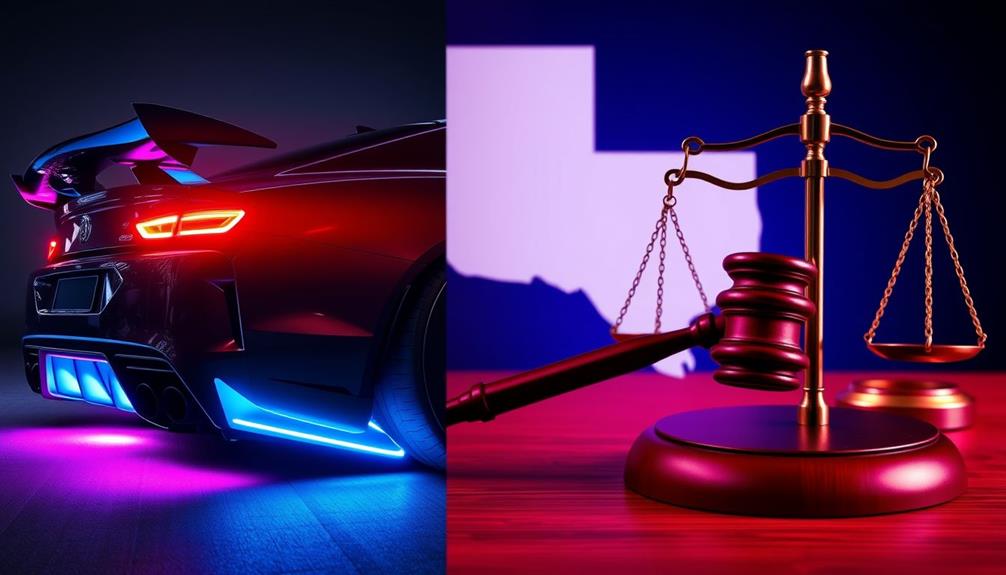
When tuning your car, you need to take into account both federal emissions regulations and state-specific laws, as they can vary greatly.
Ignoring these rules could lead to hefty fines and potential legal issues, so it's essential to know what's allowed in your area.
Additionally, unauthorized modifications might void your vehicle's warranty, so always check your warranty policy before making changes.
Federal Emissions Regulations
Maneuvering federal emissions regulations can feel like steering through a maze for car enthusiasts looking to modify their vehicles. Understanding these regulations is essential because federal law prohibits tampering with emissions control systems.
If you make modifications that defeat or bypass these systems, you're breaking the law. The Environmental Protection Agency (EPA) strictly enforces regulations that limit aftermarket modifications affecting emissions, such as diesel deletes and unapproved catalytic converters.
When you tune your vehicle, be cautious about altering emissions-related settings on the engine control module (ECM). Doing so can lead to violations of federal emissions regulations, putting you at risk of fines and penalties.
Additionally, your vehicle must pass smog checks and meet emission standards to remain road-legal after modifications. This emphasizes the importance of knowing and adhering to these federal guidelines.
While you might be keen to enhance performance, remember that any vehicle modification should comply with these regulations. Ignoring them can't only lead to legal trouble but also affect the environment and your vehicle's overall performance.
Stay informed to guarantee your modifications keep you on the right side of the law.
State-Specific Modifications Laws
Maneuvering the patchwork of state-specific modification laws is vital for car enthusiasts who want to tune their vehicles legally. While car tuning is generally permissible in the U.S., you must guarantee your modifications comply with both federal and state laws.
Here are three key points to keep in mind:
- Emissions Compliance: Federal law prohibits tampering with emissions control systems. If your tuning affects these devices, it's likely illegal, regardless of where you live.
- State Regulations: Some states enforce stricter emissions laws than federal standards. What's acceptable in one state could lead to penalties in another, so always check your local laws.
- Potential Consequences: Modifications that increase emissions or involve removing catalytic converters may result in fines, vehicle impoundment, or failed inspections.
Being well-informed about legal car modifications and state laws is vital. Ignoring these regulations can lead to serious issues, including complications with your insurance.
Always stay updated on your local laws to enjoy your tuning projects without legal hassles.
Warranty and Liability Issues
Understanding state-specific modification laws isn't just about compliance; it also impacts your vehicle's warranty and liability. When you make unauthorized modifications, you risk voiding your manufacturer warranty. Many manufacturers deny claims related to modifications that affect vehicle performance or emissions control systems.
Federal law strictly prohibits tampering with emissions control devices, and modifications that impact these components can lead to serious legal consequences, including warranty loss. It's essential to know that some states have even stricter emissions regulations than federal standards. If you violate these state laws through tuning, you increase your risk of warranty issues.
Documentation is key. Manufacturers often require clear records of any modifications for warranty claims, so keep detailed notes of all changes made to your vehicle.
Before you engage in car tuning, carefully review your vehicle manufacturer's warranty policies. This will help you understand how modifications may affect your coverage and liability. By being informed, you can make better decisions and avoid potential pitfalls that could cost you considerably down the road.
Emissions and Environmental Impact
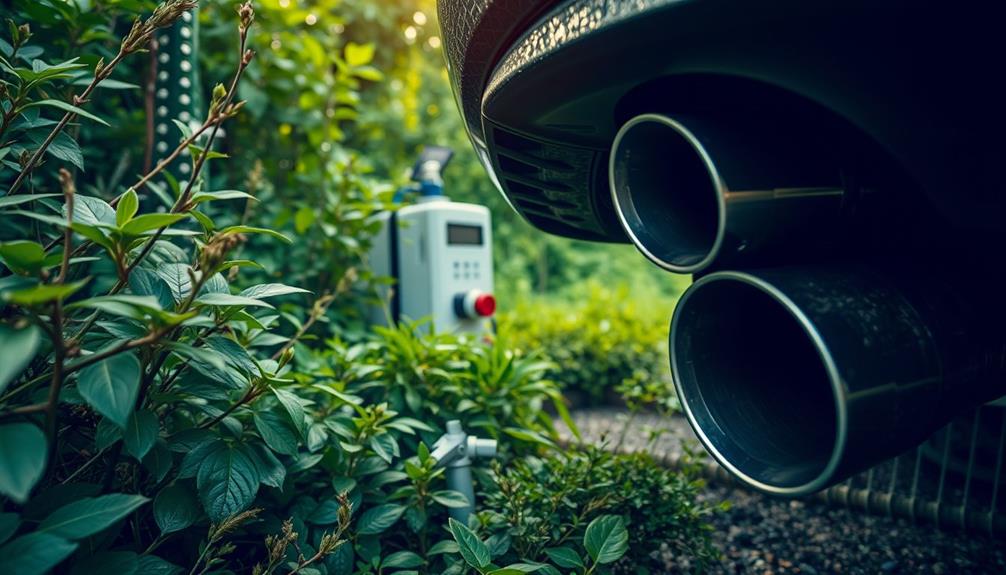
When tuning your car, it's essential to understand emissions control regulations that can vary from federal to state levels.
Modifications can lead to increased emissions, which not only impact the environment but can also make your vehicle illegal to drive.
Staying informed about local laws and responsible tuning practices helps you avoid legal trouble while protecting the planet.
Emission Control Regulations
Modifying your vehicle can be exciting, but it's crucial to be aware of emission control regulations that come into play. Federal law prohibits modifications that tamper with emissions control systems, and violating these rules can lead to enforcement actions.
As you consider tuning your vehicle, keep the following in mind:
- Tampering is Illegal: Changes to your exhaust system that affect emissions control can lead to hefty fines.
- State Regulations Vary: Some states have stricter emissions-related laws than federal standards, so check your local regulations before making any changes.
- Responsible Practices Matter: Retaining essential components like catalytic converters and adhering to emissions testing can help you stay compliant.
Tuning your Engine Control Module (ECM) improperly can also increase emissions, which not only affects your vehicle's legality but can harm the environment.
Understanding these regulations will help you enjoy your modifications without running into legal trouble. Always prioritize responsible tuning to contribute positively to air quality and sustainability while keeping your ride road-legal.
Environmental Consequences of Tuning
Car tuning can have significant environmental consequences, especially when it comes to emissions. Modifying your vehicle might seem harmless, but certain changes can lead to increased car exhaust and higher levels of harmful gases.
Many modifications, particularly those that alter or remove emissions control systems, are illegal and can result in hefty fines from the Environmental Protection Agency (EPA).
While some tuning practices can enhance engine efficiency and potentially lower emissions, removing components like catalytic converters isn't just illegal but also harmful to air quality.
Additionally, be aware that some states enforce stricter emissions regulations than federal standards, so what's acceptable in one area could land you in trouble elsewhere.
To minimize your environmental impact and stay within the law, it's essential to adopt responsible tuning practices. Always verify your modified vehicle passes emissions tests after any alterations.
Types of Legal Modifications

While many car enthusiasts seek to enhance their vehicles, it's crucial to understand the types of legal modifications available. Some modifications may be legal as long as they comply with local regulations.
Here are three popular options:
- Engine Upgrades: You can upgrade your engine for better performance, provided it meets local emissions regulations and safety standards. Always check what's allowed in your area.
- Window Tinting: Tinting is a great way to improve your vehicle's aesthetics and comfort. Rear windows can be tinted dark, but remember that front-side windows must allow more than 25% light penetration.
- Aftermarket Exhaust Systems: Installing a new exhaust can enhance your vehicle's sound and performance. Just verify your system doesn't exceed local noise limits, usually capped at 85 decibels.
Other modifications, like suspension tweaks and light upgrades, also fall under the legal umbrella, as long as they adhere to specific requirements.
Consequences of Illegal Tuning

Engaging in illegal tuning can have serious repercussions that extend beyond just a fine. When you modify your car in ways that violate emissions and vehicle modification laws, you risk significant financial penalties, including hefty fines and traffic tickets.
Law enforcement officers may even impound your vehicle, forcing you to attend mandatory court hearings to address these violations.
If your modifications tamper with emissions control systems, you could face federal penalties under the Clean Air Act. This not only complicates your financial situation but could also affect your insurance coverage. Insurers may deny claims if they determine that your illegal tuning contributed to any damage or loss, leaving you to cover the costs out of pocket.
Moreover, getting caught with illegal modifications can lead to increased scrutiny during inspections. If you repeatedly violate tuning laws, you might face even more severe consequences, including license suspension.
Ultimately, the risks associated with illegal tuning far outweigh the benefits, so it's best to stay within legal boundaries when you modify your car.
Local Law Enforcement Practices

Monitoring vehicle modifications is a key responsibility for local law enforcement. They actively enforce regulations to guarantee that your vehicle meets safety and noise standards. Here are three main areas they focus on:
- Noise Regulations: Officers often target sound modifications that exceed 95 decibels during traffic stops, as excessive noise can lead to disturbances in the community.
- Routine Inspections: During vehicle inspections, law enforcement scrutinizes modifications related to frame, suspension, engine performance, and aftermarket lighting to guarantee compliance with safety regulations.
- Window Tinting: Compliance with state-specific light transmission laws for window tinting is another common focus. Officers check if your vehicle's tint meets legal standards to avoid traffic violations.
If local law enforcement finds that your vehicle is unsafe or improperly equipped due to illegal modifications, they've the authority to impound it, which can lead to significant financial penalties.
Traffic laws regarding vehicle modifications can vary by state, so it's essential to understand your local regulations. This knowledge can help you avoid unnecessary legal issues and keep your car tuning endeavors within the law.
Resources for Tuning Enthusiasts

For tuning enthusiasts, a wealth of resources is available to help enhance your skills and knowledge. You can find educational courses tailored for all skill levels, emphasizing core principles of tuning. Many of these courses offer full refunds if your expectations aren't met, ensuring you invest wisely. Subscribers often enjoy exclusive content and discounts, making the learning experience even better.
Engaging with the community is essential, and new features allow you to track your vehicle's performance and share insights with fellow tuning enthusiasts. If you're a first-time enrollee, you can take advantage of promotions like an automatic $50 discount, which encourages you to participate and invite friends.
Online resources and forums are invaluable, offering discussions on tuning experiences, legal implications, and best practices within the automotive community. By connecting with others, you can stay informed about the latest trends and regulations related to tuning.
This collaborative environment not only enhances your knowledge but also helps you navigate the legal aspects of tuning, ensuring you're compliant while enjoying your passion.
Best Practices for Compliance

When it comes to car tuning, understanding compliance is vital for enjoying your modifications without legal headaches. Following best practices can help you stay on the right side of the law and avoid costly penalties.
- Check Emissions Regulations: Verify any engine modifications comply with both federal and state emissions regulations. This keeps your vehicle roadworthy and avoids fines.
- Document Everything: Keep thorough documentation of all modifications and tuning performed on your vehicle. This is important for warranty claims or inspections, and it helps prove compliance if questioned by authorities.
- Know Noise Limits: Familiarize yourself with local noise ordinances to verify your modifications—like an upgraded sound system or exhaust—stay within legal decibel limits. You don't want your license plate to be linked to complaints about excessive noise.
Additionally, consult professionals before making significant changes to your vehicle's frame, suspension, or lighting.
Regularly check for updates on state-specific vehicle modification laws, as regulations can change, impacting the legality of your modifications. Staying informed is key to enjoying your tuned car safely and legally.
Frequently Asked Questions
Is Car Tuning Legal in the Usa?
Car tuning's generally legal in the USA, but you need to check your state's specific regulations. Keep in mind, modifying emissions systems can lead to legal issues, so always stay informed about local laws.
What Engine Mods Are Legal?
You can legally upgrade your engine with performance chips and intake systems, as long as you make certain your vehicle passes emissions tests. Always check local regulations, since what's allowed can vary considerably from place to place.
Can I Modify My Car in Texas?
If your car's a canvas, Texas lets you paint! You can modify your ride, but keep an eye on local regulations. Make certain your upgrades respect noise limits, emissions tests, and safety standards to cruise smoothly.
Is Tuning a Car a Modification?
Yes, tuning a car's engine is definitely a modification. You're adjusting settings to enhance performance or efficiency, which can involve changing fuel maps or ignition timing. Just remember to keep emissions regulations in mind while you're at it.
Conclusion
Steering through car tuning can feel like walking a tightrope between creativity and legality. On one side, you've got the thrill of customization, transforming your ride into a personal masterpiece. On the other, the potential pitfalls of illegal modifications loom large, risking fines or worse. By understanding the rules and making informed choices, you can enjoy the best of both worlds—enhancing your vehicle while staying on the right side of the law. So, tune wisely!

